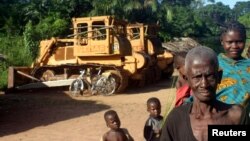KINSHASA, Congo - Environmental activists say timber companies are flouting the law in the Democratic Republic of Congo, with the complicity of the government. The environmental pressure group Greenpeace on Monday revealed results of a study showing that companies operating in the Congo are using illegal permits to get around a ban on new logging concessions.
Greenpeace says it has evidence timber companies are expanding their operations despite a ban on new logging concessions in Congo. The moratorium was imposed by the government in 2005, but since then the rate at which Congo’s forests are shrinking has accelerated.
The pressure group sent undercover observers to two locations in Bandundu province, after receiving reports that logging companies were operating with artisanal, meaning small scale, permits.
'Artisanal' loggers anything but
One of the places they visited is an important habitat for bonobos, an endangered species that scientists say is man’s closest relative in the animal kingdom.
Just Van Den Broek, Greenpeace coordinator in Congo, said their investigators found large-scale logging at the two locations.
"These are so-called artisanal loggers. In reality it is big-scale industrial logging, using heavy machinery, with a lot of people all over the place, even guarded with military. This has nothing to do with small scale artisanal logging," said Van Den Broek.
Under Congolese law, artisanal loggers are only permitted to work in community forests, near large population centers, to use chainsaws, but not heavy machinery, and must be owned by Congolese nationals. He said neither location meets these criteria.
Foreign companies exporting
Van Den Broek said the people seen managing these operations in the forests are not Congolese. He also said the four companies are owned by Lebanese, Jordanian and Chinese nationals, and that the logs they felled were for export.
They showed Greenpeace investigators artisanal logging permits, but Van Den Broek said they are not legal.
"The permits they showed us, they were signed in Kinshasa, by the ministry, while these [artisanal] permits have to be signed in the provinces themselves. The permits were for a much bigger area than they are supposed to be according to the law, and some of the companies had 11 permits while they are only supposed to have two, etc."
The Greenpeace observers followed the timber down the river Congo to Kinshasa. Van den Broek said it all ended up in big harbors, where it is mixed with timber from industrial sites and exported to North America, Europe and Asia.
Van Den Broek said the four companies monitored are typical.
"We’ve heard the same stories from all over the country, basically. You can see also in the permit system that two to three years ago there were very little permits for artisanal logging, and then it rose to 50 and then last year it was 72. They’ve really found a way to circumvent this moratorium," he said.
Failure to apply standards
Starting next year, the European Union will apply new standards for sustainable forestry and the DRC government wants its timber certified accordingly. But Greenpeace says management of the country’s forests is not yet in compliance with those standards.
Another international NGO, Resources Extraction Monitoring [REM], which works closely with the government, has reached a similar conclusion. REM says on its website that the Congo's environment ministry is blocking the publication of its reports despite a previous agreement with donors that they would be made public.
A spokeswoman for the Timber Industry Federation in Congo, Francoise Van Der Wen, said monitoring organizations have raised the issue with the government for more than a year.
"I’m happy that finally, I would say, Greenpeace acts on this, because we have been crying out about this situation since last year," said Van Der Wen.
Federation members have been trying to get their exports certified as sustainable timber, by investing in social contracts with communities and working with the government and civil society on monitoring. But Van Der Wen said her members feel they are wasting their time and money when fake artisanal operators are ruining the reputation of Congolese forestry.
"We actually feel we don’t see how we can continue anymore because this illegal exploitation has reached such a value that it’s like illegal competition," she said.
Key issues affect communities
Van der Wen estimates that most of the timber leaving the east of the country and about 20% leaving the west of the country is illegally felled.
The Congolese authorities are reluctant to comment on the Greenpeace report. However, Alain Bussy, an aide to the new environment minister, said they will be looking into the NGO’s claims about illegal permits.
He said the new team took over at the ministry less than a week ago, so they need time to investigate the dossier. He suggested that once they understand what’s been going on and know how the situation is evolving, they may be able to take a position. But the current minister was a close adviser to the previous environment minister, and likely is aware of reports submitted to the government by monitoring groups in the past 18 months.
Van Den Broek said the people who might be able to protect the Congo’s forests are the people who live there. Those communities, he said, benefit very little from either industrial or artisanal logging. He said if they were given control over logging in their areas there would be a better chance of sustainable forestry.







